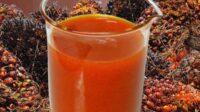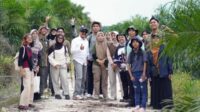PALMOILMAGAZINE, JAKARTA – A new strategic partnership has been officially launched to promote a more inclusive, resilient, and sustainable palm oil production system in Indonesia. Known as the Rokan Hulu Landscape and Livelihoods Initiative, this program brings together diverse stakeholders committed to environmental conservation and the improvement of smallholder livelihoods in the palm oil sector.
The initiative involves Musim Mas, a leading integrated global palm oil company, and Ferrero, a major international confectionery manufacturer. It also includes the participation of international non-governmental organizations: Preferred by Nature, Agriterra, and the Sustainable Agriculture Network (SAN).
Funded by the Danida Green Business Partnerships (DGBP) under the Government of Denmark, this collaborative effort aims to enhance the welfare of independent smallholders, protect the environment, and promote sustainable palm oil production aligned with global sustainability standards. The program is also designed to comply with international regulations, notably the EU Deforestation Regulation (EUDR).
A Five-Year Initiative to Scale Sustainable Palm Oil Practices
Spanning five years, the Rokan Hulu Landscape and Livelihoods Initiative focuses on scalable, replicable solutions to enable sustainable palm oil production. The program targets support for 5,400 independent smallholders in adopting regenerative agricultural practices to improve plantation management, reduce chemical inputs, and strengthen resilience to climate change impacts.
Implemented in Rokan Hulu, Riau, the initiative will also strengthen two smallholder associations and assist 2,500 smallholders in achieving certification under both the Roundtable on Sustainable Palm Oil (RSPO) and Indonesia Sustainable Palm Oil (ISPO) standards.
In addition, the program will foster income diversification opportunities for 2,000 community members, 60% of whom are women, while implementing efforts to conserve biodiversity and reduce deforestation risks. A key element of the initiative is the establishment of multi-stakeholder collaborations at the jurisdictional level, aimed at ecosystem restoration and alignment with global sustainability frameworks.
Roles of Partners and Technical Expertise
Preferred by Nature, an international NGO based in Denmark with extensive experience in sustainable agriculture and forestry projects, will coordinate the program, lead capacity building, and provide training in sustainable practices.
Agriterra, a Dutch agricultural development organization, will focus on strengthening smallholder associations, promoting financial sustainability, and developing cooperative business models.
SAN will contribute its expertise in regenerative agriculture and provide direct field support through its local Indonesian partners, Kaleka and Setara Jambi.
Meanwhile, Musim Mas and Ferrero share a commitment to building a transparent, traceable, and sustainable palm oil supply chain that complies with regulatory requirements and voluntary corporate commitments.
Tackling Systemic Challenges in the Palm Oil Supply Chain
The program aligns the shared goals of Musim Mas and Ferrero with broader development objectives to address systemic challenges within the independent smallholder supply chain. These challenges include low productivity, limited awareness of sustainable farming practices, and environmental degradation, such as soil deterioration.
Independent smallholders, who manage over 40% of Indonesia’s oil palm land, often struggle to meet RSPO and ISPO standards due to constraints in resources, uneven access to information, and land legality issues. Through this initiative, they will receive the necessary tools and training to implement sustainable practices, achieve certification, and expand market access.
At the landscape level, the program builds cross-sector partnerships involving companies, government bodies, and civil society to enhance ecosystem protection. These collective efforts will strengthen biodiversity conservation and ensure alignment with international frameworks such as the EUDR.
A Scalable Model for Sustainable Palm Oil Production
By combining private sector commitment with the expertise of nonprofit organizations, the Rokan Hulu Landscape and Livelihoods Initiative sets a new benchmark for sustainable palm oil production. It aims to create a win-win scenario for all stakeholders: smallholders benefit from increased productivity, broader market access, and diversified income streams, while companies like Ferrero and Musim Mas can secure a reliable and traceable supply chain.
The program also aims to deliver long-term economic benefits to rural communities, support the achievement of global climate goals, and position Rokan Hulu as a model landscape for sustainable palm oil production in Indonesia and beyond.
This transformative initiative serves as a foundation for building a more sustainable and inclusive palm oil industry in Indonesia. By addressing systemic challenges and fostering multi-stakeholder collaboration, the program aims to create a resilient, environmentally responsible supply chain that delivers shared benefits across the value chain.
Olivier Tichit, Director of Communications and Sustainability at Musim Mas, emphasized the importance of empowering smallholders, “Training and supporting independent smallholders is essential to developing a robust and sustainable palm oil supply chain. Musim Mas applies a landscape-based approach to sustainability. Through our Smallholder Hubs, we collaborate with governments, suppliers, NGOs, and local communities to drive real change. This initiative allows us to deepen that commitment and work alongside new partners,” he said in a statement to beige-heron-208544.hostingersite.com.
Nicola Somenzi, Head of Responsible Sourcing at Ferrero, shared a similar perspective:
“Our goal is to build a strong supply chain that brings tangible benefits to smallholders and communities while preserving people and nature. Beyond sourcing only Segregated RSPO-certified palm oil, our involvement in initiatives like this strengthens the foundation of a resilient and environmentally responsible supply chain—delivering lasting impact for all stakeholders.”
Jakob Ryding, Senior Director of Projects at Preferred by Nature, highlighted the critical role of smallholders, “Sustainable palm oil is only possible when smallholders are equipped with the right knowledge, resources, and market access. This initiative is a great example of how partnerships between businesses and NGOs can address structural challenges, empower growers, and protect ecosystems. We are proud to be part of this effort.”
Jose Joaquín Campos, Executive Director of SAN, added, “By integrating regenerative agriculture and nature-based solutions, this initiative demonstrates how sustainable farming practices can both restore ecosystems and improve farmer livelihoods.”
Marco Schouten, CEO of Stichting Agriterra, underlined the importance of strengthening farmer organizations, “Supporting independent smallholder associations is at the heart of our role. This project equips them with the tools and capacity they need to achieve financial resilience and tap into new market opportunities through collective action.” (P3)





































